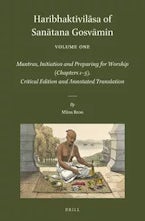- Home
- religion
- philosophy
- Hindu Worldviews

Hindu Worldviews
Theories of Self, Ritual and Reality
By: Jessica Frazier
240 Pages
- Paperback
- ISBN: 9781474251556
- Published By: Bloomsbury Academic
- Published: February 2017
$37.95
For quite some time, South Asian religious studies have been in a transition out of the old ways of thinking dominated by the colonial worldview of the 18th and 19th centuries, into a more pluralistic, postmodern approach. Jessica Frazier's book Hindu Worldviews: Theories of Self, Ritual, and Reality, partakes in this new approach in an important and informative way. Though not explicitly postcolonial in methodology, Frazier allows Hindu scriptures and their interpreters to speak for themselves and deftly draws points of connection to contemporary philosophies and metaphysics. One does not need to be an expert in Hindu scriptures, nor need to know any of the original Sanskrit dialects in order to understand Frazier's use of the religious texts. Translations, as well as source locations, are given for all scriptures, and transliteration is used in a precise manner, situating the analysis in its original context and giving the reader an understanding of the depth of knowledge behind the work. Summaries of concepts central to Hinduism would be helpful for the uninitiated reader to explore the depth of Frazier's examination of classical Hindu “theories of everything.”
Frazier begins her examination of Hindu worldviews with the explicit intention of "doing with India's Sanskritic cultures what Western scholars have long done with classical Greek and Roman ones" (Frazier 1). That is to examine what was written and thought about in classical Hindu texts, and to dig into the world of the classical Hindu practitioner, hopefully without the imposition of outside sources. Frazier approaches the concepts of self, ritual, and reality from the context of Hindu worldviews, primarily examining the Upanisads, and drawing on many other classical Hindu scriptures, such as the Rg Veda and Bhagavad Gita and a few lesser known texts, to illustrate similarities and differences as changes occurred over time. This process reveals multiform worldviews in both classical and modern times, with some key concepts drawing more tightly together over time, but not necessarily to a unified worldview. Frazier has two intentions in providing this examination of classical Hindu worldviews: first, to show the multiplicity of worldviews that go back to the earliest writings in the Hindu tradition, and second, to place these conceptions into a larger vocabulary of global theories.
Following an in depth introduction to her “global” theory and methodology of Hindu religious studies, Frazier divides Hindu Worldviews into three sections. Though the subtitle suggests the three sections are self, ritual, and reality, Frazier interweaves these core themes into all of the sections, allowing varying worldviews to bring forth these concepts, revealing the interwoven embodied lives of classical Hindu thinkers and practitioners. The three sections are as follows: "The Art of Embodiment: the Self Made of Matter”: "Becoming the World: the Self Made of Thought”; and "Shaping the World: Classical Embodiment in Practice."
One can appreciate from the section headings that Hindu thought, broadly speaking, moves between the self and the world: how the self is conceived of shapes how the world is enacted. This dualism within Hindu thought, as Frazier shows us, is not the same as the Western-Cartesian concept of a dualism between mind and body, but one of a dualism between agency and the materials which agency can shape. "World and body," Frazier says, according to classical Upanisadic thought, "share the same fundamental fabrics of reality, and so embodiment…functions as en-worldment in this context" (Frazier 197). Although Frazier is giving a materialist interpretation of classical Hinduism, this claim runs through many of the earliest scriptures under examination, giving weight to her claims of much more tightly held material/spiritual worldviews and practices that later separated into divergent schools of thought. But Frazier's interpretation of classical texts as more materialist than we often suppose is not to say that she reads them as merely materialist/naturalist. Frazier often contrasts her reading of the Upanisads and other early writings against that of the Carvaka materialist/naturalist school of atheistic thought that stood in opposition to all of the theistic approaches of Hindu religious thought.
Frazier rides a fine line in this interpretive mode. She seems to suggest that there are underlying concepts that run contrary to the brahmanic system, yet does not fully engage in the interrogation of that system and how it came to be. Though this may not have been the intent of the book in the first place, it does leave open some gaps regarding major concepts of the Hindu worldview that need further examination, if one is to show that a materialist reading, albeit a very broadly conceived materialism, is tenable. Overall Frazier rides this line conservatively, avoiding the Westernization typical of earlier generations of scholars.
Hindu Worldviews stands strong in a field that has been reinvestigating methodologies, bridging the sometimes overlooked aspects of religions and cultures as missed by the colonizing gaze. Frazier does careful work in engaging the classical Hindu worldviews towards her second goal of finding a more global theory of everything, as well as adeptly focusing on her first stated goal of exploring the classical worldviews of a multiform Hinduism.
Jay D. O. Potter is a doctoral candidate in religious and comparative theologies and philosophies at the Claremont School of Theology.
Jay PotterDate Of Review:September 14, 2017
Jessica Frazier is research fellow at the Oxford Centre for Hindu Studies, UK, and lecturer in religious studies at the University of Kent, UK.











